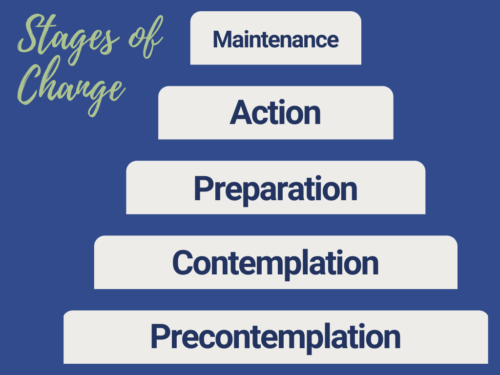Just what is the relationship between Stages of Change & Motivational Interviewing

Many people confuse the Stages of Change with Motivational Interviewing. They aren’t the same thing, but they work super nicely together.
(Fun fact, they both came out around the same time in the early 1980’s!)
The Stages of Change, also called the transtheoretical model or ‘readiness to change’ model, was created by James Prochaska and Carlo DiClemente. They identified five stages through which people progress as they are moving through change. It’s kinda cool- I can consider any change I’ve been through or any I’m currently working on and map out the stages.
Plus, I love utilizing the Stages of Change as an assessment tool with clients. If I know what stage of change they are in, I can meet them with the best intervention and support for that stage!

Stages of Change, also called the Transtheoretical Model, was developed by James O. Prochaska and Carlo Di Clemente.
Here’s the breakdown!
1. Precontemplation
This is the “before thinking about it” stage. I also think of it as the “not yet ready to talk about it” stage. There is no intention of changing. When a client is in the precontemplative stage, I may hear language that indicates defensiveness about the issue, lack of desire for change, blame of other people for their dilemma, or minimization. Some might call this stage “denial” (I never loved that word…but I did love a definition I read once of denial as “not yet ready.”) When I am in the precontemplation stage of change, I push thoughts of change away, I avoid thinking about it, I minimize the need for change. Working with clients who are precontemplative about a needed change can be so vexing. Next week, I’ll share some tips on working with clients in precontemplation!
2. Contemplation
This is the “thinking about it” stage. Clients in this stage may talk about their ambivalence about change (and ambivalence is normal!). They know what they want to change, but aren’t yet ready to do it. They argue for and against change, citing reasons to change and reasons not to. When I am stuck in contemplation about something, I can be hard on myself, find myself chewing on it a lot, flip flopping back and forth. Sometimes we feel like we are crazy- why can’t I just do it?! Plus, it can drive an interviewer crazy! “Well, do they want to change or not?!” BUT, ambivalence is normal and this is a delicate and important stage to work with. Motivational Interviewing was designed to work with clients in the contemplation stage.
3. Preparation
This is when clients begin envisioning and planning change. They are ready to make change a priority. They may begin asking questions about change, wondering how other people do it, or what resources are available to them. At this stage, cultivating confidence and helping clients gather all the information and tools they need is important. When I am in the preparation stage of change, I need to get specific and clear about what I am doing and when, who I might want to support me, where I can solicit accountability, and what I’ll do if a barrier comes up in the process. SMART goal planning is key!
4. Action
This is when change is in full swing. Our clients are in action, DOING the actual change they have been thinking and talking about. Momentum is building, old habits are being replaced with new. Our role is to support the change, troubleshoot when needed, reinforce the positives of the change. When I am in action, I usually feel really great about myself. I’m doing it!
5. Maintenance
This is when change has become a habit, integrated into a new way of life. Reinforcement, troubleshooting and supporting clients may be helpful when they are maintaining a new change. Many times, the change itself has rewards that are self-reinforcing. Folks ‘exit’ the stages once they have maintained change for a while.
A few key points about these Stages- they are linear, but also recursive.
Yep, I wish clients could just progress smoothly through these stages like stairs they go up and don’t come down.
But the change process is not tidy like that. It’s normal to dip our toe into the next stage then go back, or even move from contemplation to preparation and action, then slide back to just thinking about it again (or giving up, deprioritizing and going back to precontemplation).
There is no prescribed time period for each of these stages.
Your client (or yourself) may be in one of these stages for minutes, or YEARS. Consider a change you have known would be good for you to make, but are not right now.
How long were you avoiding thinking about that change? (Maybe you are now!) What has ambivalence looked like for you? How did you prepare to make the change, or would you if you haven’t yet? What would support your action and maintenance stages?
Motivational Interviewing is designed to help people resolve their ambivalence about change. The tools of MI are excellent for working with both precontemplative and contemplative clients. Next week I’ll talk more about the confounding precontemplative stage of change and I’ll give you some tips!
Motivational Interviewing Tip of the Week: What stage of change is your client in right now around a needed change? Consider what intervention is most helpful for that stage. MI is developed for clients who are stuck in ambivalence about change: contemplation. Through evocative questions and selective reflecting, MI supports the resolution of ambivalence to guide people forward in the stages of change!
Related Posts

What is Macro Motivational Interviewing?
Did you know that Motivational Interviewing is being applied to systems work? It’s called macro MI! One of the limitations of traditional approaches to Motivational Interviewing (MI) is the narrow focus on individual behavior change. Yet we know that an individual is...
Related Posts

Motivational Interviewing for SELF Change!
You may be recovering from the intensity of the holidays, or perhaps your holiday season was rejuvenating and nourishing. Or, a little of both?! First of all, HAPPY NEW YEAR! Don’t fall into the New Year's Resolutions trap! Only 9% of people actually complete New...

Let’s Learn Together!
Hi, I’m Hillary Bolter. At MI Center for Change, Motivational Interviewing is our passion. Motivational Interviewing will help you become more effective and efficient as you support clients’ change!

